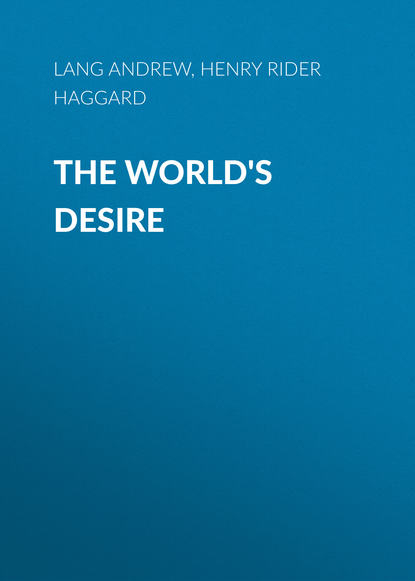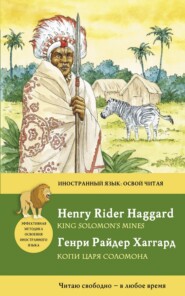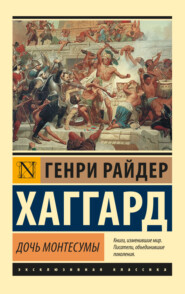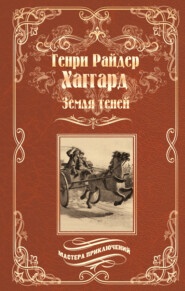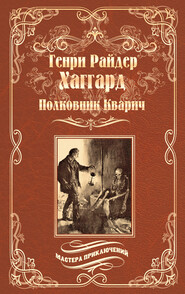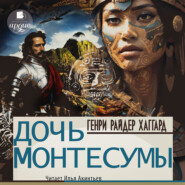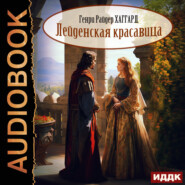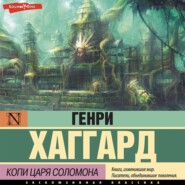По всем вопросам обращайтесь на: info@litportal.ru
(©) 2003-2024.
✖
The World's Desire
Настройки чтения
Размер шрифта
Высота строк
Поля
“‘Thou serpent,’ said the Prince, pale with rage and fear. ‘I tell thee I will kiss thee yet, whether thou wilt or not, and thou shalt pay for this.’
“But she laughed softly now that her anger was spent, and I led him forth to seek a physician, who should bind up his wound. And when he was gone, I returned, and spoke to her, wringing my hands.
“‘Oh, Royal Lady, what hast thou done? Thou knowest well that thy divine father destines thee to wed the Prince of Kush whom but now thou didst smite so fiercely.’
“‘Nay, Rei, I will none of him – the dull clod, who is called the son of Pharaoh. Moreover, he is my half-brother, and it is not meet that I should wed my brother. For nature cries aloud against the custom of the land.’
“‘Nevertheless, Lady, it is the custom of thy Royal house, and thy father’s will. Thus the Gods, thine ancestors, were wed; Isis to Osiris. Thus great Thothmes and Amenemhat did and decreed, and all their forefathers and all their seed. Oh, bethink thee – I speak it for thine ear, for I love thee as mine own daughter – bethink thee, for thou canst not escape, that Pharaoh’s bed is the step to Pharaoh’s throne. Thou lovest power; here is the gate of power, and mayhap upon a time the master of the gate shall be gone and thou shalt sit in the gate alone.’
“‘Ah, Rei, now thou speakest like the counsellor of those who would be kings. Oh, did I not hate him with this hatred! And yet can I rule him. Why, ‘twas no chance game that we played this night: the future lay upon the board. See, his diadem is upon my brow! At first he won, for I chose that he should win. Well, so mayhap it shall be; mayhap I shall give myself to him – hating him the while. And then the next game; that shall be for life and love and all things dear, and I shall win it, and mine shall be the uraeus crest, and mine shall be the double crown of ancient Khem, and I shall rule like Hatshepu, the great Queen of old, for I am strong, and to the strong is victory.’
“‘Yes,’ I made answer, ‘but, Lady, see thou that the Gods turn not thy strength to weakness; thou art too passionate to be all strength, and in a woman’s heart passion is the door by which King Folly enters. To-day thou hatest, beware, lest to-morrow thou should’st love.’
“‘Love,’ she said, gazing scornfully; ‘Meriamun loves not till she find a man worthy of her love.’
“‘Ay, and then – ?’
“‘And then she loves to all destruction, and woe to them who cross her path. Rei, farewell.’
“Then suddenly she spoke to me in another tongue, that few know save her and me, and that none can read save her and me, a dead tongue of a dead people, the people of that ancient City of the Rock, whence all our fathers came.[2 - Probably the mysterious and indecipherable ancient books, which were occasionally excavated in old Egypt, were written in this dead language of a more ancient and now forgotten people. Such was the book discovered at Coptos, in the sanctuary there, by a priest of the Goddess. “The whole earth was dark, but the moon shone all about the Book.” A scribe of the period of the Ramessids mentions another indecipherable ancient writing. “Thou tellest me thou understandest no word of it, good or bad. There is, as it were, a wall about it that none may climb. Thou art instructed, yet thou knowest it not; this makes me afraid.”Birch, Zeitschrift, 1871, pp. 61-64. Papyrus Anastasi I, pl. X. 1. 8, pl. X. 1. 4. Maspero, Hist. Anc., pp. 66-67.]
“‘I go,’ she said, and I trembled as she spoke, for no man speaks in this language when he has any good thought in his heart. ‘I go to seek the counsel of That thou knowest,’ and she touched the golden snake which she had won.
“Then I threw myself on the earth at her feet, and clasped her knees, crying, ‘My daughter, my daughter, sin not this great sin. Nay, for all the kingdom of the world, wake not That which sleepeth, nor warm again into life That which is a-cold.’
“But she only nodded, and put me from her,” – and the old man’s face grew pale as he spoke.
“What meant she?” said the Wanderer.
“Nay, wake not thou That which sleepeth, Wanderer,” he said, at length. “My tongue is sealed. I tell thee more that I would tell another. Do not ask, – but hark! They come again! Now may Ra and Pasht and Amen curse them; may the red swine’s mouth of Set gnaw upon them in Amenti; may the Fish of Sebek flesh his teeth of stone in them for ever, and feed and feed again!”
“Why dost thou curse thus, Rei, and who are they that go by?” said the Wanderer. “I hear their tramping and their song.”
Indeed there came a light noise of many shuffling feet, pattering outside the Palace wall, and the words of a song rang out triumphantly:
The Lord our God He doth sign and wonder,
Tokens He shows in the land of Khem,
He hath shattered the pride of the Kings asunder
And casteth His shoe o’er the Gods of them!
He hath brought forth frogs in their holy places,
He hath sprinkled the dust upon crown and hem,
He hath hated their kings and hath darkened their faces;
Wonders He works in the land of Khem.
“These are the accursed blaspheming conjurors and slaves, the Apura,” said Rei, as the music and the tramping died away. “Their magic is greater than the lore even of us who are instructed, for their leader was one of ourselves, a shaven priest, and knows our wisdom. Never do they march and sing thus but evil comes of it. Ere day dawn we shall have news of them. May the Gods destroy them, they are gone for the hour. It were well if Meriamun the Queen would let them go for ever, as they desire, to their death in the desert, but she hardens the King’s heart.”
VII THE QUEEN’S VISION
There was silence without at last; the clamour and the tread of the Apura were hushed in the distance, dying far away, and Rei grew calm, when he heard no longer the wild song, and the clashing of the timbrels.
“I must tell thee, Eperitus,” he said, “how the matter ended between the divine Prince and Meriamun. She bowed her pride before her father and her brother: her father’s will was hers; she seemed to let her secret sleep, and she set her own price on her hand. In everything she must be the equal of Pharaoh – that was her price; and in all the temples and all the cities she was to be solemnly proclaimed joint heir with him of the Upper and Lower Land. The bargain was struck and the price was paid. After that night over the game of pieces Meriamun was changed. Thenceforth she did not mock at the Prince, she made herself gentle and submissive to his will.
“So the time drew on till at length in the beginning of the rising of the waters came the day of her bridal. With a mighty pomp was Pharaoh’s daughter wedded to Pharaoh’s son. But her hand was cold as she stood at the altar, cold as the hand of one who sleeps in Osiris. Proudly and coldly she sat in the golden chariot passing in and out the great gates of Tanis. Only when she listened and heard the acclaiming thousands cry Meriamun so loudly that the cry of Meneptah was lost in the echoes of her name – then only did she smile.
“Cold, too, she sat in her white robes at the feast that Pharaoh made, and she never looked at the husband by her side, though he looked kindly on her.
“The feast was long, but it ended at last, and then came the music and the singers, but Meriamun, making excuse, rose and went out, attended by her ladies. And I also, weary and sad at heart, passed thence to my own chamber and busied myself with the instruments of my art, for, stranger, I build the houses of gods and kings.
“Presently, as I sat, there came a knocking at the door, and a woman entered wrapped in a heavy cloak. She put aside the cloak, and before me was Meriamun in all her bridal robes.
“‘Heed me not, Rei,’ she said, ‘I am yet free for an hour; and I would watch thee at thy labour. Nay, it is my humour; gainsay me not, for I love well to look on that wrinkled face of thine, scored by the cunning chisel of thy knowledge and thy years. So from a child have I watched thee tracing the shapes of mighty temples that shall endure when ourselves, and perchance the very Gods we worship, have long since ceased to be. Ah, Rei, thou wise man, thine is the better part, for thou buildest in cold enduring stone and attirest thy walls as thy fancy bids thee. But I – I build in the dust of human hearts, and my will is written in their dust. When I am dead, raise me a tomb more beautiful than ever has been known, and write upon the portal, Here, in the last temple of her pride, dwells that tired builder, Meriamun, the Queen.’
“Thus she talked wildly in words with little reason.
“‘Nay, speak not so,’ I said, ‘for is it not thy bridal night? What dost thou here at such a time?’
“‘What do I here? Surely I come to be a child again! See, Rei, in all wide Khem there is no woman so shamed, so lost, so utterly undone as is to-night the Royal Meriamun, whom thou lovest. I am lower than she who plies the street for bread, for the loftier the spirit the greater is the fall. I am sold into shame, and power is my price. Oh, cursed be the fate of woman who only by her beauty can be great. Oh, cursed be that ancient Counsellor thou wottest of, and cursed be I who wakened That which slept, and warmed That which was a-cold in my breath and in my breast! And cursed be this sin to which he led me! Spurn me, Rei; strike me on the cheek, spit upon me, on Meriamun, the Royal harlot who sells herself to win a crown. Oh, I hate him, hate him, and I will pay him in shame for shame – him, the clown in king’s attire. See here,’ – and from her robe she drew a white flower that was known to her and me – ‘twice to-day have I been minded with this deadly blossom to make an end of me, and of all my shame, and all my empty greed of glory. But this thought has held my hand: I, Meriamun, will live to look across his grave and break his images, and beat out the writings of his name from every temple wall in Khem, as they beat out the hated name of Hatshepu. I – ’ and suddenly she burst into a rain of tears; she who was not wont to weep.
“‘Nay, touch me not,’ she said. ‘They were but tears of anger. Meriamun is mistress of her Fate, not Fate of Meriamun. And now, my lord awaits me, and I must be gone. Kiss me on the brow, old friend, whilst yet I am the Meriamun thou knewest, and then kiss me no more for ever. At the least this is well for thee, for when Meriamun is Queen of Khem thou shalt be first in all the land, and stand on the footsteps of my throne. Farewell.’ And she gathered up her raiment and cast her white flower of death in the flame of the brazier, and was gone, leaving me yet sadder at heart. For now I knew that she was not as other women are, but greater for good or evil.
“On the morrow night I sat again at my task, and again there came a knocking at the door, and again a woman entered and threw aside her wrappings. It was Meriamun. She was pale and stern, and as I rose she waved me back.
“‘Has, then, the Prince – thy husband – ’ I stammered.
“‘Speak not to me of the Prince, Rei, my servant,’ she made answer. ‘Yesterday I spoke to thee wildly, my mind was overwrought; let it be forgotten – a wife am I, a happy wife’; and she smiled so strangely that I shrunk back from her.
“‘Now to my errand. I have dreamed a dream, a troublous dream, and thou art wise and instructed, therefore I pray thee interpret my vision. I slept and dreamed of a man, and in my dream I loved him more than I can tell. For my heart beat to his heart, and in the light of him I lived, and all my soul was his, and I knew that I loved him for ever. And Pharaoh was my husband; but, in my dream, I loved him not. Now there came a woman rising out of the sea, more beautiful than I, with a beauty fairer and more changeful than the dawn upon the mountains; and she, too, loved this godlike man, and he loved her. Then we strove together for his love, matching beauty against beauty, and wit against wit, and magic against magic. Now one conquered, and now the other; but in the end the victory was mine, and I went arrayed as for a marriage-bed – and I clasped a corpse.
“‘I woke, and again I slept, and saw myself wearing another garb, and speaking another tongue. Before me was the man I loved, and there, too, was the woman, wrapped about with beauty, and I was changed, and yet I was the very Meriamun thou seest. And once more we struggled for the mastery and for this man’s love, and in that day she conquered me.
“‘I slept, and again I woke, and in another land than Khem – a strange land, and yet methought I knew it from long ago. There I dwelt among the graves, and dark faces were about me, and I wore That thou knowest for a girdle. And the tombs of the rock wherein we dwelt were scored with the writings of a dead tongue – the tongue of that land whence our fathers came. We were all changed, yet the same, and once more the woman and I struggled for the mastery, and though I seemed to conquer, yet a sea of fire came over me, and I woke and I slept again.
“‘Then confusion was piled upon confusion, nor can my memory hold all that came to pass. For this game played itself afresh in lands, and lives, and tongues without number. Only the last bout and the winner were not revealed to me.
“‘And in my dream I cried aloud to the protecting Gods to escape out of the dream, and I sought for light that I might see whence these things were. Then, as in a vision, the Past opened up its gates. It seemed that upon a time, thousand, thousand ages agone, I and this man of my dream had arisen from nothingness and looked in each other’s eyes, and loved with a love unspeakable, and vowed a vow that shall endure from time to time and world to world. For we were not mortal then, but partook of the nature of the Gods, being more fair and great than any of human kind, and our happiness was the happiness of Heaven. But in our great joy we hearkened to the Voice of the That thou knowest, of that Thing, Rei, with which, against thy counsel, I have but lately dealt. The kiss of our love awakened That which slept, the fire of our love warmed That which was a-cold! We defied the holy Gods, worshipping them not, but rather each the other, for we knew that as the Gods we were eternal. And the Gods were angered against us and drew us up into their presence. And while we trembled they spake as with a voice:
“‘"Ye twain who are one life, each completing each, because with your kisses ye have wakened That which slept, and with the fire of your love have warmed That which was a-cold: because ye have forgotten them that gave you life and love and joy: hearken to your Doom!
“‘"From Two be ye made Three, and through all Time strive ye to be Twain again. Pass from this Holy Place down to the Hell of Earth, and though ye be immortal put on the garments of mortality. Pass on from Life to Life, live and love and hate and seem to die: have acquaintance with every lot, and in your blind forgetfulness, being one and being equal, work each other’s woe according to the law of Earth, and for your love’s sake sin and be shamed, perish and re-arise, appear to conquer and be conquered, pursuing your threefold destiny, and, at the word of Fate, the unaltering circle meets, and the veil of blindness falls from your eyes, and, as a scroll, your folly is unrolled, and the hid purpose of your sorrow is accomplished and once more ye are Twain and One.”
“‘Then, as we trembled, clinging each to each, again the great Voice spoke:
“‘"Ye twain who are One – let That to which ye have hearkened divide you and enfold you! Be ye Three!”
“‘And as the Voice spoke I was torn with agony, and strength went out of me, and there, by him I loved, stood the woman of my dream crowned with every glory and adorned with the Star. And we were three. And between him and me, yet enfolding him and me, writhed that Thing thou wottest of. And he whom I loved turned to look upon the fair woman, wondering, and she smiled and stretched out her arm towards him as one who would take that which is her own, and Rei, in that hour, though it was but in a dream, I knew the mortal pain of jealousy, and awoke trembling. And now read thou this vision, Rei, thou who art learned in the interpretation of dreams and in the ways of sleep.’
“‘Oh, Lady,’ I made answer, ‘this thing is too high for me, I cannot interpret it; but where thou art, there may I be to help thee.’
“‘I know thy love,’ she said, ‘but in thy words is little light. So – so – let it pass! It was but a dream, and if indeed it came from the Under World, why, it was from no helpful God, but rather from Set, the Tormentor; or from Pasht, the Terrible, who throws the creeping shadow of her doom upon the mirror of my sleep. For that which is decreed will surely come to pass! I am blown like the dust by the breath of Fate; now to rest upon the Temple’s loftiest tops, now to be trodden underfoot of slaves, and now to be swallowed by the bitter deep, and in season thence rolled forth again. I love not this lord of mine, who shall be Pharaoh, and never may he come whom I shall love. ‘Tis well that I love him not, for to love is to be a slave. When the heart is cold then the hand is strong, and I am fain to be the Queen leading Pharaoh by the beard, the first of all the ancient land of Khem; for I was not born to serve. Nay, while I may, I rule, awaiting the end of rule. Look forth, Rei, and see how the rays from Mother Isis’ throne flood all the courts and all the city’s streets and break in light upon the water’s breast. So shall the Moon-child’s flame flood all this land of Khem. What matters it, if ere the morn Isis must pass to her dominion of the Dead, and the voice of Meriamun be hushed within a sepulchre?’
“But she laughed softly now that her anger was spent, and I led him forth to seek a physician, who should bind up his wound. And when he was gone, I returned, and spoke to her, wringing my hands.
“‘Oh, Royal Lady, what hast thou done? Thou knowest well that thy divine father destines thee to wed the Prince of Kush whom but now thou didst smite so fiercely.’
“‘Nay, Rei, I will none of him – the dull clod, who is called the son of Pharaoh. Moreover, he is my half-brother, and it is not meet that I should wed my brother. For nature cries aloud against the custom of the land.’
“‘Nevertheless, Lady, it is the custom of thy Royal house, and thy father’s will. Thus the Gods, thine ancestors, were wed; Isis to Osiris. Thus great Thothmes and Amenemhat did and decreed, and all their forefathers and all their seed. Oh, bethink thee – I speak it for thine ear, for I love thee as mine own daughter – bethink thee, for thou canst not escape, that Pharaoh’s bed is the step to Pharaoh’s throne. Thou lovest power; here is the gate of power, and mayhap upon a time the master of the gate shall be gone and thou shalt sit in the gate alone.’
“‘Ah, Rei, now thou speakest like the counsellor of those who would be kings. Oh, did I not hate him with this hatred! And yet can I rule him. Why, ‘twas no chance game that we played this night: the future lay upon the board. See, his diadem is upon my brow! At first he won, for I chose that he should win. Well, so mayhap it shall be; mayhap I shall give myself to him – hating him the while. And then the next game; that shall be for life and love and all things dear, and I shall win it, and mine shall be the uraeus crest, and mine shall be the double crown of ancient Khem, and I shall rule like Hatshepu, the great Queen of old, for I am strong, and to the strong is victory.’
“‘Yes,’ I made answer, ‘but, Lady, see thou that the Gods turn not thy strength to weakness; thou art too passionate to be all strength, and in a woman’s heart passion is the door by which King Folly enters. To-day thou hatest, beware, lest to-morrow thou should’st love.’
“‘Love,’ she said, gazing scornfully; ‘Meriamun loves not till she find a man worthy of her love.’
“‘Ay, and then – ?’
“‘And then she loves to all destruction, and woe to them who cross her path. Rei, farewell.’
“Then suddenly she spoke to me in another tongue, that few know save her and me, and that none can read save her and me, a dead tongue of a dead people, the people of that ancient City of the Rock, whence all our fathers came.[2 - Probably the mysterious and indecipherable ancient books, which were occasionally excavated in old Egypt, were written in this dead language of a more ancient and now forgotten people. Such was the book discovered at Coptos, in the sanctuary there, by a priest of the Goddess. “The whole earth was dark, but the moon shone all about the Book.” A scribe of the period of the Ramessids mentions another indecipherable ancient writing. “Thou tellest me thou understandest no word of it, good or bad. There is, as it were, a wall about it that none may climb. Thou art instructed, yet thou knowest it not; this makes me afraid.”Birch, Zeitschrift, 1871, pp. 61-64. Papyrus Anastasi I, pl. X. 1. 8, pl. X. 1. 4. Maspero, Hist. Anc., pp. 66-67.]
“‘I go,’ she said, and I trembled as she spoke, for no man speaks in this language when he has any good thought in his heart. ‘I go to seek the counsel of That thou knowest,’ and she touched the golden snake which she had won.
“Then I threw myself on the earth at her feet, and clasped her knees, crying, ‘My daughter, my daughter, sin not this great sin. Nay, for all the kingdom of the world, wake not That which sleepeth, nor warm again into life That which is a-cold.’
“But she only nodded, and put me from her,” – and the old man’s face grew pale as he spoke.
“What meant she?” said the Wanderer.
“Nay, wake not thou That which sleepeth, Wanderer,” he said, at length. “My tongue is sealed. I tell thee more that I would tell another. Do not ask, – but hark! They come again! Now may Ra and Pasht and Amen curse them; may the red swine’s mouth of Set gnaw upon them in Amenti; may the Fish of Sebek flesh his teeth of stone in them for ever, and feed and feed again!”
“Why dost thou curse thus, Rei, and who are they that go by?” said the Wanderer. “I hear their tramping and their song.”
Indeed there came a light noise of many shuffling feet, pattering outside the Palace wall, and the words of a song rang out triumphantly:
The Lord our God He doth sign and wonder,
Tokens He shows in the land of Khem,
He hath shattered the pride of the Kings asunder
And casteth His shoe o’er the Gods of them!
He hath brought forth frogs in their holy places,
He hath sprinkled the dust upon crown and hem,
He hath hated their kings and hath darkened their faces;
Wonders He works in the land of Khem.
“These are the accursed blaspheming conjurors and slaves, the Apura,” said Rei, as the music and the tramping died away. “Their magic is greater than the lore even of us who are instructed, for their leader was one of ourselves, a shaven priest, and knows our wisdom. Never do they march and sing thus but evil comes of it. Ere day dawn we shall have news of them. May the Gods destroy them, they are gone for the hour. It were well if Meriamun the Queen would let them go for ever, as they desire, to their death in the desert, but she hardens the King’s heart.”
VII THE QUEEN’S VISION
There was silence without at last; the clamour and the tread of the Apura were hushed in the distance, dying far away, and Rei grew calm, when he heard no longer the wild song, and the clashing of the timbrels.
“I must tell thee, Eperitus,” he said, “how the matter ended between the divine Prince and Meriamun. She bowed her pride before her father and her brother: her father’s will was hers; she seemed to let her secret sleep, and she set her own price on her hand. In everything she must be the equal of Pharaoh – that was her price; and in all the temples and all the cities she was to be solemnly proclaimed joint heir with him of the Upper and Lower Land. The bargain was struck and the price was paid. After that night over the game of pieces Meriamun was changed. Thenceforth she did not mock at the Prince, she made herself gentle and submissive to his will.
“So the time drew on till at length in the beginning of the rising of the waters came the day of her bridal. With a mighty pomp was Pharaoh’s daughter wedded to Pharaoh’s son. But her hand was cold as she stood at the altar, cold as the hand of one who sleeps in Osiris. Proudly and coldly she sat in the golden chariot passing in and out the great gates of Tanis. Only when she listened and heard the acclaiming thousands cry Meriamun so loudly that the cry of Meneptah was lost in the echoes of her name – then only did she smile.
“Cold, too, she sat in her white robes at the feast that Pharaoh made, and she never looked at the husband by her side, though he looked kindly on her.
“The feast was long, but it ended at last, and then came the music and the singers, but Meriamun, making excuse, rose and went out, attended by her ladies. And I also, weary and sad at heart, passed thence to my own chamber and busied myself with the instruments of my art, for, stranger, I build the houses of gods and kings.
“Presently, as I sat, there came a knocking at the door, and a woman entered wrapped in a heavy cloak. She put aside the cloak, and before me was Meriamun in all her bridal robes.
“‘Heed me not, Rei,’ she said, ‘I am yet free for an hour; and I would watch thee at thy labour. Nay, it is my humour; gainsay me not, for I love well to look on that wrinkled face of thine, scored by the cunning chisel of thy knowledge and thy years. So from a child have I watched thee tracing the shapes of mighty temples that shall endure when ourselves, and perchance the very Gods we worship, have long since ceased to be. Ah, Rei, thou wise man, thine is the better part, for thou buildest in cold enduring stone and attirest thy walls as thy fancy bids thee. But I – I build in the dust of human hearts, and my will is written in their dust. When I am dead, raise me a tomb more beautiful than ever has been known, and write upon the portal, Here, in the last temple of her pride, dwells that tired builder, Meriamun, the Queen.’
“Thus she talked wildly in words with little reason.
“‘Nay, speak not so,’ I said, ‘for is it not thy bridal night? What dost thou here at such a time?’
“‘What do I here? Surely I come to be a child again! See, Rei, in all wide Khem there is no woman so shamed, so lost, so utterly undone as is to-night the Royal Meriamun, whom thou lovest. I am lower than she who plies the street for bread, for the loftier the spirit the greater is the fall. I am sold into shame, and power is my price. Oh, cursed be the fate of woman who only by her beauty can be great. Oh, cursed be that ancient Counsellor thou wottest of, and cursed be I who wakened That which slept, and warmed That which was a-cold in my breath and in my breast! And cursed be this sin to which he led me! Spurn me, Rei; strike me on the cheek, spit upon me, on Meriamun, the Royal harlot who sells herself to win a crown. Oh, I hate him, hate him, and I will pay him in shame for shame – him, the clown in king’s attire. See here,’ – and from her robe she drew a white flower that was known to her and me – ‘twice to-day have I been minded with this deadly blossom to make an end of me, and of all my shame, and all my empty greed of glory. But this thought has held my hand: I, Meriamun, will live to look across his grave and break his images, and beat out the writings of his name from every temple wall in Khem, as they beat out the hated name of Hatshepu. I – ’ and suddenly she burst into a rain of tears; she who was not wont to weep.
“‘Nay, touch me not,’ she said. ‘They were but tears of anger. Meriamun is mistress of her Fate, not Fate of Meriamun. And now, my lord awaits me, and I must be gone. Kiss me on the brow, old friend, whilst yet I am the Meriamun thou knewest, and then kiss me no more for ever. At the least this is well for thee, for when Meriamun is Queen of Khem thou shalt be first in all the land, and stand on the footsteps of my throne. Farewell.’ And she gathered up her raiment and cast her white flower of death in the flame of the brazier, and was gone, leaving me yet sadder at heart. For now I knew that she was not as other women are, but greater for good or evil.
“On the morrow night I sat again at my task, and again there came a knocking at the door, and again a woman entered and threw aside her wrappings. It was Meriamun. She was pale and stern, and as I rose she waved me back.
“‘Has, then, the Prince – thy husband – ’ I stammered.
“‘Speak not to me of the Prince, Rei, my servant,’ she made answer. ‘Yesterday I spoke to thee wildly, my mind was overwrought; let it be forgotten – a wife am I, a happy wife’; and she smiled so strangely that I shrunk back from her.
“‘Now to my errand. I have dreamed a dream, a troublous dream, and thou art wise and instructed, therefore I pray thee interpret my vision. I slept and dreamed of a man, and in my dream I loved him more than I can tell. For my heart beat to his heart, and in the light of him I lived, and all my soul was his, and I knew that I loved him for ever. And Pharaoh was my husband; but, in my dream, I loved him not. Now there came a woman rising out of the sea, more beautiful than I, with a beauty fairer and more changeful than the dawn upon the mountains; and she, too, loved this godlike man, and he loved her. Then we strove together for his love, matching beauty against beauty, and wit against wit, and magic against magic. Now one conquered, and now the other; but in the end the victory was mine, and I went arrayed as for a marriage-bed – and I clasped a corpse.
“‘I woke, and again I slept, and saw myself wearing another garb, and speaking another tongue. Before me was the man I loved, and there, too, was the woman, wrapped about with beauty, and I was changed, and yet I was the very Meriamun thou seest. And once more we struggled for the mastery and for this man’s love, and in that day she conquered me.
“‘I slept, and again I woke, and in another land than Khem – a strange land, and yet methought I knew it from long ago. There I dwelt among the graves, and dark faces were about me, and I wore That thou knowest for a girdle. And the tombs of the rock wherein we dwelt were scored with the writings of a dead tongue – the tongue of that land whence our fathers came. We were all changed, yet the same, and once more the woman and I struggled for the mastery, and though I seemed to conquer, yet a sea of fire came over me, and I woke and I slept again.
“‘Then confusion was piled upon confusion, nor can my memory hold all that came to pass. For this game played itself afresh in lands, and lives, and tongues without number. Only the last bout and the winner were not revealed to me.
“‘And in my dream I cried aloud to the protecting Gods to escape out of the dream, and I sought for light that I might see whence these things were. Then, as in a vision, the Past opened up its gates. It seemed that upon a time, thousand, thousand ages agone, I and this man of my dream had arisen from nothingness and looked in each other’s eyes, and loved with a love unspeakable, and vowed a vow that shall endure from time to time and world to world. For we were not mortal then, but partook of the nature of the Gods, being more fair and great than any of human kind, and our happiness was the happiness of Heaven. But in our great joy we hearkened to the Voice of the That thou knowest, of that Thing, Rei, with which, against thy counsel, I have but lately dealt. The kiss of our love awakened That which slept, the fire of our love warmed That which was a-cold! We defied the holy Gods, worshipping them not, but rather each the other, for we knew that as the Gods we were eternal. And the Gods were angered against us and drew us up into their presence. And while we trembled they spake as with a voice:
“‘"Ye twain who are one life, each completing each, because with your kisses ye have wakened That which slept, and with the fire of your love have warmed That which was a-cold: because ye have forgotten them that gave you life and love and joy: hearken to your Doom!
“‘"From Two be ye made Three, and through all Time strive ye to be Twain again. Pass from this Holy Place down to the Hell of Earth, and though ye be immortal put on the garments of mortality. Pass on from Life to Life, live and love and hate and seem to die: have acquaintance with every lot, and in your blind forgetfulness, being one and being equal, work each other’s woe according to the law of Earth, and for your love’s sake sin and be shamed, perish and re-arise, appear to conquer and be conquered, pursuing your threefold destiny, and, at the word of Fate, the unaltering circle meets, and the veil of blindness falls from your eyes, and, as a scroll, your folly is unrolled, and the hid purpose of your sorrow is accomplished and once more ye are Twain and One.”
“‘Then, as we trembled, clinging each to each, again the great Voice spoke:
“‘"Ye twain who are One – let That to which ye have hearkened divide you and enfold you! Be ye Three!”
“‘And as the Voice spoke I was torn with agony, and strength went out of me, and there, by him I loved, stood the woman of my dream crowned with every glory and adorned with the Star. And we were three. And between him and me, yet enfolding him and me, writhed that Thing thou wottest of. And he whom I loved turned to look upon the fair woman, wondering, and she smiled and stretched out her arm towards him as one who would take that which is her own, and Rei, in that hour, though it was but in a dream, I knew the mortal pain of jealousy, and awoke trembling. And now read thou this vision, Rei, thou who art learned in the interpretation of dreams and in the ways of sleep.’
“‘Oh, Lady,’ I made answer, ‘this thing is too high for me, I cannot interpret it; but where thou art, there may I be to help thee.’
“‘I know thy love,’ she said, ‘but in thy words is little light. So – so – let it pass! It was but a dream, and if indeed it came from the Under World, why, it was from no helpful God, but rather from Set, the Tormentor; or from Pasht, the Terrible, who throws the creeping shadow of her doom upon the mirror of my sleep. For that which is decreed will surely come to pass! I am blown like the dust by the breath of Fate; now to rest upon the Temple’s loftiest tops, now to be trodden underfoot of slaves, and now to be swallowed by the bitter deep, and in season thence rolled forth again. I love not this lord of mine, who shall be Pharaoh, and never may he come whom I shall love. ‘Tis well that I love him not, for to love is to be a slave. When the heart is cold then the hand is strong, and I am fain to be the Queen leading Pharaoh by the beard, the first of all the ancient land of Khem; for I was not born to serve. Nay, while I may, I rule, awaiting the end of rule. Look forth, Rei, and see how the rays from Mother Isis’ throne flood all the courts and all the city’s streets and break in light upon the water’s breast. So shall the Moon-child’s flame flood all this land of Khem. What matters it, if ere the morn Isis must pass to her dominion of the Dead, and the voice of Meriamun be hushed within a sepulchre?’





